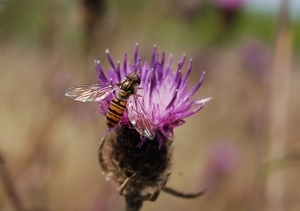 For the first time, a new pan-European research project being funded by the European Commission – and headed by leading UK research charity the Game & Wildlife Conservation Trust (GWCT) – aims to look at how we can best protect vital natural resources, across Europe.
For the first time, a new pan-European research project being funded by the European Commission – and headed by leading UK research charity the Game & Wildlife Conservation Trust (GWCT) – aims to look at how we can best protect vital natural resources, across Europe.
Nature provides a multitude of hidden benefits to us worth billions of pounds to the UK economy. The economic benefits of nature are seen most clearly in food production, which depends on organisms such as soil microbes, earthworms and pollinating insects. According to recent government figures, pollinators alone are worth £430 million per year to British agriculture.(2)
The new study, which will look at how we can better protect these natural resources, is called the QUESSA project (Quantification of Ecosystem Services for Sustainable Agriculture). Over the time of the study it aims to identify the natural key habitats on farmland that provide these vital services and will develop systems that farmers and policy makers can use to ensure our landscapes work efficiently and effectively for us in the future.
Dr John Holland, an entomologist with the GWCT, explains the importance of this 4-year study, “With wildlife declining across Europe, the QUESSA project will help to identify areas of uncropped farmland, such as woodlands, hedges and margins that need to be targeted and improved to maximise their use by pollinators, natural pest controllers, wildlife or to help improve soil conservation and provide clean water. For ecological as well as economic reasons it is vital that we safeguard these natural resources.”
The QUESSA project, which is receiving almost 3 million Euros through the European Union’s Framework 7 programme(3), involves research partners from France, Italy, Germany, Netherlands, Switzerland, Estonia, Hungary and the UK.
Dr Holland explains, “We will be particularly looking at how we can improve semi-natural habitats outside and within crops in order to provide a true value on the natural services that each habitat provides.
Through case studies, discussions with farmers, policy makers, and various organisations within each country, the QUESSA research team will aim to work out a scoring system for each habitat. This information can then be used to create a novel web-based application that farmers can use to determine their own levels of ecosystem services provision. This unique system will enable farmers to have a better understanding of what areas need improving and importantly, how this can be achieved.
To become involved in this important project, Dr Holland from the Game & Wildlife Conservation Trust is keen to hear from farmers, agronomists or people providing advice on farmland for feedback and study sites across the UK.
END
Photocaption: Pollinators such as the hoverfly are worth £430 million per yer to British agriculture. The QUESSA project will help to protect this and other vital natural resources.
Photocredit: Peter Thompson, GWCT.
Notes to editors
The Game & Wildlife Conservation Trust is an independent wildlife conservation charity which carries out scientific research into Britain’s game and wildlife. We advise farmers and landowners on improving wildlife habitats and we lobby for agricultural and conservation policies based on science. We employ 20 post-doctoral scientists and 40 other research staff with expertise in areas such as birds, insects, mammals, farming and statistics. We undertake our own research as well as projects funded by contract and grant-aid from Government and private bodies. The Trust is also responsible for a number of Government Biodiversity Action Plan species and is lead partner for grey partridge and joint lead partner for brown hare and black grouse. For Information, contact: Morag Walker, Head of Media, Telephone: 01425-652381, Direct: 01425-651000, Mobile: 07736-124097
(2) Department of Farming and Rural Affairs (DEFRA) report on the economic benefits of ecoysystem services.
(3) The FP7 framework programme, launched in 2007, has a total budget of €55 billion for research and innovation. It has so far supported some 19,000 projects involving over 79,000 participants (universities, research organisations and businesses) across all EU Member States. Support under the Seventh Framework Programme for Research (FP7) is available for projects and ideas that will boost Europe's competitiveness and tackle issues such as improving human health, protecting the environment and finding new solutions to challenges arising, for example, from urbanisation and managing waste.